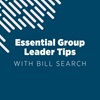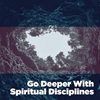Note: This article is excerpted from Invitation to Solitude and Silence: Experiencing God's Transforming Presence.
I am often asked, "What if I spend time in solitude and fall asleep?" Perhaps the most spiritual thing we could do is get more rest so we are alert when we want to be alert. But we can also use our times of solitude as opportunities to rest in God. I have come to count on extended times of solitude as opportunities to take at least one nap, and I experience God's delight and care as I rest in him. There is a very deep kind of refreshment that comes when we incorporate rest into our times alone with God.
As I have paid more attention to my tiredness and fatigue, I have learned that there are at least two kinds of tired. One is what I call "good tired." This is the kind of tiredness we experience after a job well done, a task accomplished out of the best of who we are. If we are living in healthy rhythms of work and rest, this tiredness is a temporary condition, and when it comes, we know that after we take appropriate time for rest and recuperation, we will soon be back in the swing of things.
But another kind of tiredness is more ominous, and this is what I call "dangerous tired." It is deeper and more serious than the temporary exhaustion that follows periods of intensity of schedule and workload. The difference between "good tired" and "dangerous tired" is like the difference between the atmospheric conditions that produce harmless spring rain clouds and those that bring an eerie green-tinted sky and the possibility of a tornado. When the sky is green like that, you're not quite sure what's going on, but something doesn't feel right, and you know you had better pay attention. One atmospheric condition is normal and predictable; the other is risky and volatile.
Dangerous tired is an atmospheric condition of the soul that is volatile and portends the risk of great destruction. It is a chronic inner fatigue accumulating over months and months, and it does not always manifest itself in physical exhaustion. In fact, it can be masked by excessive activity and compulsive overworking. When we are dangerously tired we feel out of control, compelled to constant activity by inner impulses that we may not be aware of. For some reason we can't quite name, we're not able to linger and relax over a cup of coffee. We can't keep from checking voicemail or e-mail just one more time before we leave the office or before we go to bed at night. Or we can't stop cleaning or doing repairs and projects in order to take a walk in the evening or be quietly available to those we love. Rather than reading anything for the sheer pleasure of it, we pile the nightstand with books and professional journals that cram our heads full of information to keep us at the top of our game. The idea of taking a full day off once a week seems impossible both in theory and in practice. We rarely, if ever, take a real break or vacation, choosing instead to work through holidays and break times. Not surprisingly, even when it is time for well-deserved sleep or rest, we may be unable to relax and receive this necessary gift.
While our way of life may seem heroic, there is a frenetic quality to our activity that is disturbing to those around us. When we do have discretionary time, we indulge in escapist behaviors—such as compulsive eating, drinking, spending, watching television—because we are too tired to choose activities that are truly life-giving.
When we are dangerously tired, we may be numb to the full range of human emotion. While it may seem like a relief to be unhampered by the negative emotions that bog other people down, in this condition the positive emotions become elusive as well. When we are dangerously tired we don't feel much of anything, good or bad. On some level we suspect that if we did stop long enough to experience our emotions, we might be overcome by feelings we'd rather not feel—sadness over past or present losses, desperation regarding aspects of our life or character that seem unfixable, powerlessness to choose the kind of life we know we're meant to live, unfulfilled desires and longings. We may be afraid that if we entered these unlit places in our souls, we might never come out.
One of the most sobering things I learned as I listened to my exhaustion and allowed God to minister to me is that when I am dangerously tired I can be very, very busy and look very, very important but be unable to hear the quiet, sure voice of the One who calls me the beloved. When that happens I lose touch with that place in the center of my being where I know who I am in God, where I know what I am called to do, and where I am responsive to his voice above all others. When that happens I am at the mercy of all manner of external forces, tossed and turned by others' expectations and my own compulsions. These inner deficiencies then become the source of my frenetic activity, keeping me forever spiraling into deeper levels of exhaustion.
As you read these words you may realize that you are teetering on the brink of dangerous tired—or that you are already over the edge. This can be a painful realization. But what would happen if, rather than judging and berating yourself, you lingered with your awareness, noticing the weariness that makes it hard for you to be attentive and alert in times of prayer and attentiveness to God? What would happen if you allowed yourself to wonder about your tiredness just a bit? Rather than criticizing yourself about falling asleep during prayer or your lack of interest in solitude, what if you gave yourself the freedom to notice your weariness with compassion? "Wow, I am really tired. I'm not sure I was aware of just how tired I am. What is that all about?"
Rather than distracting yourself in some way, what would happen if you chose to stay in God's presence and talk with him about your tiredness, acknowledging it as a child would with a parent who cares and can help? What if, rather than feeling alone and weighed down by the seeming impossibility of your situation, you invited God into it with a prayer: "Dear God, this tiredness is what's true about me. What are we going to do about it?"
Such honest noticing and questioning open up the opportunity for God to touch us and care for us in the midst of our humanness. In fact, if we do not rest ourselves—body, mind, and soul—the journey into solitude and silence could very well be too much for us.
—Taken from Invitation to Solitude and Silence: Experiencing God's Transforming Presence by Ruth Haley Barton. Copyright 2010 by Ruth Haley Barton. Used by permission of InterVarsity Press PO Box 1400 Downers Grove, IL 60515. www.ivpress.com.










